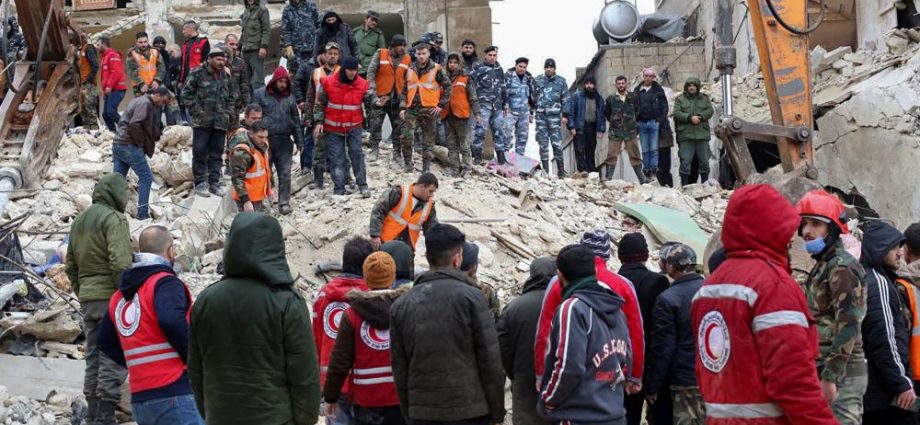
The human toll of the massive earthquakes that hit Turkey and Syria this month has been devastating. Combined, more than 46,000 people have perished, millions of children are homeless, and entire communities have been obliterated.
While Turkey has borne the brunt of the disaster – deaths there have surpassed 40,000 – Syria’s crisis is no less severe. But despite the overwhelming need, neither Syrian President Bashar al-Assad nor the government has addressed those impacted.
Instead of expressing condolences or declaring national mourning, the Syrian regime has sought to use the catastrophe to achieve political and financial gain – such as increasing its international legitimacy, lifting sanctions, and receiving more aid.
Initially, Assad portrayed his regime as the one leading disaster-relief efforts. Immediately after the quakes, he chaired an emergency meeting with the cabinet to assess the crisis. He then announced a national action plan coordinated by a central operations team, and tasked the prime minister to head these efforts.
Yet these moves were not designed with the Syrian people in mind. Assad’s goal was to use the calamity to encourage regional states to expand normalizing relations with Syria – or to take steps in that direction.
Many countries in the region severed relations with Syria soon after the outbreak of the war in 2011. But with Assad managing to cling to power, the new regional reality and a perceived diplomatic pragmatism meant that a number of Arab nations had already moved to restart ties. The earthquake has undoubtedly accelerated that process. Arab Gulf countries have also led the way with aid donations to both Syria and Turkey.
After the disaster, Assad spoke with King Hamad bin Isa Al Khalifa of Bahrain for the first time in more than a decade, and with Egyptian President Abdel Fattah El-Sisi for the first time since the latter assumed office in 2014. Likewise, Lebanon sent its first high-level delegation to Damascus since the start of the Syrian Civil War, while President Kais Saied of Tunisia confirmed his commitment to strengthen diplomatic ties with Syria.
Rounding out the diplomacy, Assad received official messages and phone calls from leaders in the United Arab Emirates, Oman, Iraq, Algeria, Jordan, Palestine, Armenia, China and Belarus.
Since the first moments of the quake, Assad has put pressure on the international community to lift sanctions. This is evidenced by the statements of regime officials (such as the foreign minister and members of parliament) and the heads of affiliated organizations (including the Syrian Red Crescent), all of which criticized Western sanctions for exacerbating the impact of the quake and demanded that they be lifted to enable aid to flow.
The government is also suspected of waging a disinformation campaign blaming the international community for the state’s inability to carry out rescue operations and provide assistance to the victims.
Even this strategy has paid off. Initially, officials in the United States and Europe challenged the regime’s claims, insisting that sanctions don’t stand in the way of life-saving efforts for the Syrian people. But a few days later, the US Treasury announced a 180-day exemption to its sanctions on Syria for all transactions related to earthquake relief efforts.
Simultaneously, the government has pushed to increase its control over the humanitarian aid that is arriving.
A day after the quakes, Syria’s ambassador to the United Nations, Bassam al-Sabbagh, told reporters that any outside aid must be delivered in coordination with Damascus and come from within Syria itself, not across the Turkish border. Sabbagh called the government’s position a matter of “sovereignty, independence, and territorial integrity.”
Unfortunately for Syria’s quake victims, it’s also unrealistic. Although aid delivery from Syrian government-controlled areas into opposition-held regions in northwestern Syria is theoretically possible, international governments are reluctant to channel aid through Damascus because of the government’s well-documented efforts to control and manipulate humanitarian support and use it as a tool to punish opponents.
Assad has finally agreed to allow UN aid deliveries into opposition-held northwestern Syria for three months via two border crossings from Turkey. But this move shouldn’t be viewed as a sign of change in Assad’s behavior. On the contrary, he likely announced this measure to prevent the West from pursuing a longer-term arrangement – something that the international community has been pushing for inside the UN Security Council.
Blocking such an agreement allows the government to increase the flow of aid through its territories, and subsequently its control over it. Also, it allows Assad to continue to use the renewal of the existing cross-border mechanism, which takes place every six months, as a bargaining chip with the international community.
Moreover, the move comes a week too late. Aid deliveries from Turkey to northwestern Syria were suspended after the Bab al-Hawa border crossing became inaccessible. To save time and lives, the government could have solved this issue immediately by granting UN agencies permission to access rebel-held Syrian territory. Instead, the government delayed, as it sought to increase the aid channeled through its areas of control.
Assad’s attempts to take advantage of such a catastrophe are merely a reminder of why millions of people inside and outside the country are still waiting, despite all the suffering they’ve endured, for the Assad regime to end.
The earthquakes on February 6 have been devastating for both Turkey and Syria. But Assad’s self-interest will only make Syria’s recovery more painful.
This article was provided by Syndication Bureau, which holds copyright.
Follow this writer on Twitter @HaidHaid22.

